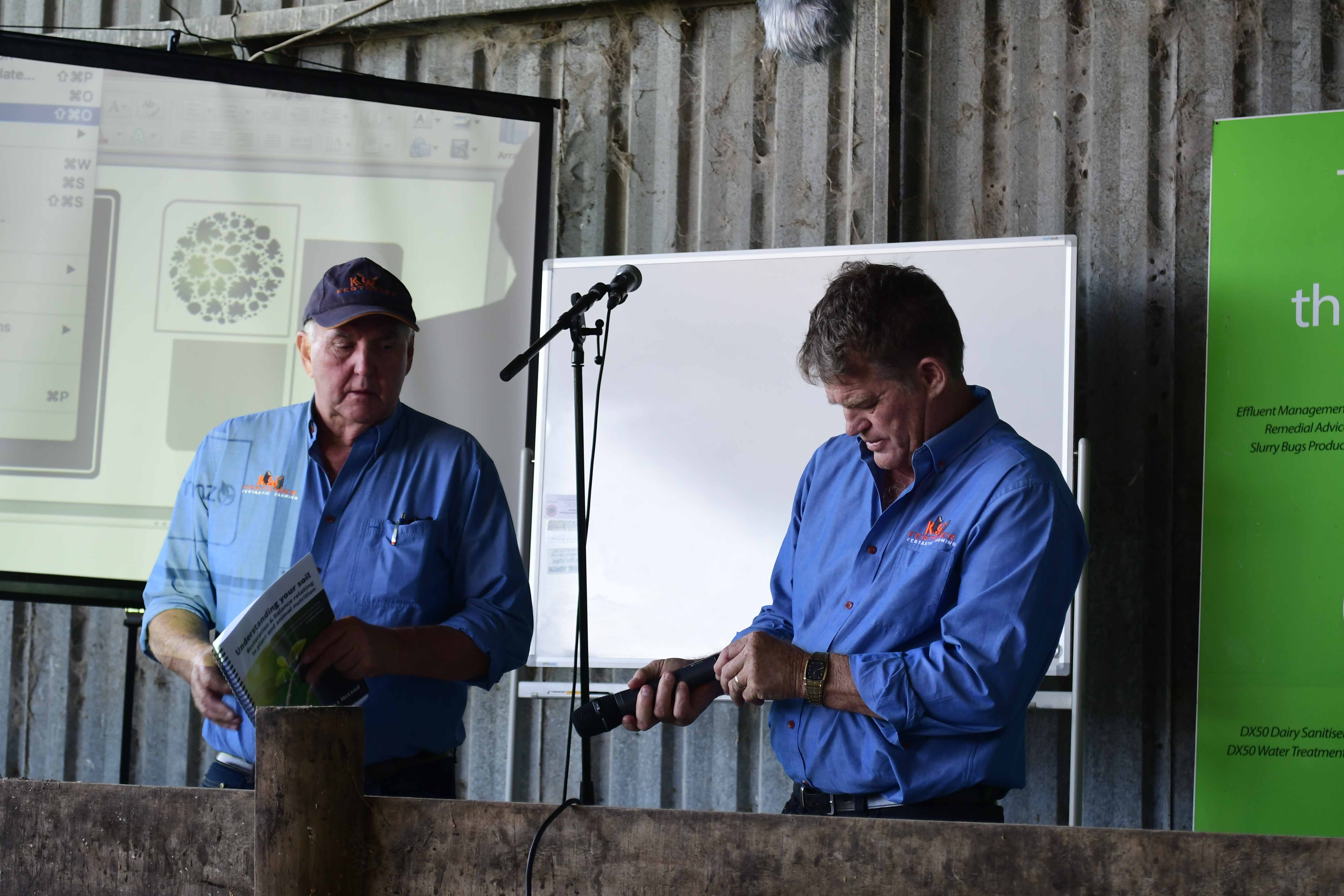Complying with climate change regulations without compromising production or profitability was the subject of two farmer field days held in the Waikato and Edgecumbe in early April.
If participant numbers are any indication, farmers are keen to learn and adopt strategies which will enable them to comply with climate change regulations while improving the health of their pasture, animals and bank balances.
The field days, held by Kiwi Fertiliser and Forward Farming, showcased the results farmers are achieving by adopting a ground-breaking approach which enables a farm to produce its own nitrogen, sequester carbon and reduce methane and leaching.
Known as Total Replacement Therapy (TRT) the system was developed by Forward Farming Biological Consultancy in conjunction with Kiwi Fertiliser and Terragen Biotech Ltd.
Speaking at the field days Forward Farming’s managing director, David Law, says the “early years of TRT involved farm trials where biological products were tested by farmers in place of ‘conventional’ chemical fertilisers including Urea. The program totally replaces a chemical fertiliser system with a biological fertiliser system.
“One of those trial farms, in the Bay of Plenty, cut the use of synthetic nitrogen from 180 units/N/ha/ to 70 units/N/ha in the transition year without any loss of production. In year two synthetic nitrogen dropped to 25 units per hectare. Over two years synthetic nitrogen reduced by 86 per cent.
“That reduction occurred during a drought and contributed to unprecedented pasture growth and clover cover which increased from 10 per cent to 70 per cent. Clover fixes nitrogen naturally so synthetic nitrogen can be reduced without sacrificing pasture production.
“This improvement in pasture quality enabled the herd to maintain consistent production through one of the area’s toughest droughts.”
And it wasn’t just “a oncer”.
“Milk production and farm profit has since remained constant,” David says.
“On this and around 30 other farms, we have proven we can turn a farm around in 18 months, reducing the spend on chemical fertilisers and synthetic nitrogen, increasing the quality and quantity of pasture and improving animal health and production.
TRT involves an eight-step program starting with an assessment and soil audit of the farm.
“The first step is an on-farm audit and soil test which enables the development of a production plan which compares previous production and profitability against projected outcomes.
“The Perry Lab soil audit and the Albrecht/ Kinsey system of soil fertility is an integral part of the program providing the farmer with a tailored guide to build soil balance essential for clover growth and beneficial biological development.”
David says the addition of a liquid biological conditioner, Terrragen Great Land, in Step 3, changes the soil microbiome and enhances root development improving the plant’s ability to withstand stress.
“Step 4 involves the reduction – but not elimination – of synthetic fertilisers.
“In the first year of adopting the program, our farmers reduce around 60 per cent of synthetic nitrogen applications and experience an increase in pasture growth.
“Enhancing animal health is the focus of Step 5, involving administering trace element and biological enhancers to animals to enhance their immunity to stress and disease.
“This has been proven to improve conception rates, lower somatic cell counts, improve milk quality and lower animal health costs.”
Six monthly soil monitoring continues in Step 6 with tailored applications of solid biological friendly fertiliser and liquid biological additives, activators and feeders.
Increasing the diversity of the pasture is at the heart of Step 7 - the aim being to add different pasture species to encourage and sustain biology to create a more sustainable balanced growing feed source throughout the season.
Step 8 calls for the development of a strategic seasonal pasture management plan. David says the diverse pasture sward that results from Step 7 means that farmers can have a longer rotation length without compromising quality and production.
“Strategic pasture management also protects the soil from the effects of over-grazing and helps mitigate the negative effects of climate change.
“TRT is a new approach but it’s one which resonates because it is recognises what we all intrinsically know – that every farm is a bio-circle. Each area flows in and out of other key areas. What is in the soil goes into the grass; what is in the grass goes into the cow; what is in the cow goes into the effluent pond and what is in the pond goes into the soil. And the circle continues.
“That bio balance translates to grass which is more nutrient rich encouraging better feeding and greater cow health and production. The soil is also more resilient with roots which go down one metre reducing leaching and improving drainage and water holding capacity during dry periods.”
“TRT enables farmers to achieve the Government limits on synthetic nitrogen fertilisers for the same or less than they are currently spending with better cow health, production and soil health.”



0 Comments
Leave a Comment